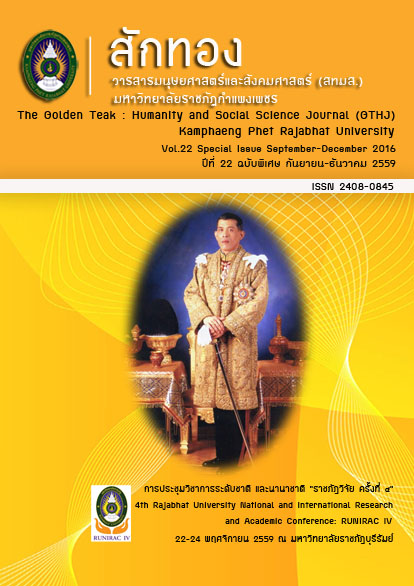วัฒนธรรม ประเพณี ภูมิปัญญาท้องถิ่นเกี่ยวกับการปลูกข้าวพื้นเมืองของชาวนาในเขตอำเภอเมืองและอำเภอไทรงาม จังหวัดกำแพงเพชร
Main Article Content
Abstract
บทคัดย่อ
การศึกษาความหลากหลายของพันธุ์ข้าวพื้นเมืองอำเภอเมืองและอำเภอไทรงาม จังหวัดกำแพงเพชร มีวัตถุประสงค์เพื่อศึกษาวัฒนธรรม ประเพณี ภูมิปัญญาท้องถิ่นเกี่ยวกับการปลูกข้าวพันธุ์พื้นเมืองของชาวนา ในเขตอำเภอเมืองและอำเภอไทรงาม จังหวัดกำแพงเพชร รวบรวมข้อมูลโดยใช้แบบสัมภาษณ์แบบไม่มีโครงสร้าง และสัมภาษณ์ข้อมูลเชิงลึก (In-depth Interview) กับชาวนาที่ปลูกข้าวพันธุ์พื้นเมือง เขตอำเภอเมือง และอำเภอไทรงาม จำนวน 15 ครอบครัว วิเคราะห์ข้อมูลโดยใช้วิธีวิจัยเชิงคุณภาพ ได้แก่ การวิเคราะห์เนื้อหา (Content Analysis) และเขียนพรรณนาวิเคราะห์ (Descriptive Analysis) ผลการวิจัยพบว่า ชาวนามีความเชื่อและศรัทธาในแม่โพสพว่า คือ จิตวิญญาณที่ผูกพันอยู่ในต้นข้าว และเป็นผู้ดูแลคุ้มครองให้ต้นข้าวเจริญงอกงามให้ผลผลิตที่ดีสมบูรณ์ และจะดูแลทุกคนในครอบครัวให้มีความสุขเจริญรุ่งเรือง โดยประเพณีที่ทำ แบ่งออกเป็นช่วงระยะการปฏิบัติได้เป็นสามช่วง ระยะแรก ข้าวออกรวง เรียกว่าข้าวตั้งท้อง หรือแม่โพสพตั้งท้อง ช่วงระยะที่สองเป็นช่วงระยะเก็บเกี่ยวนำและกลับไปเข้ายุ้งฉาง และช่วงระยะสุดท้ายนำออกจากยุ้งฉางมาสีเป็นข้าวสารรับประทาน ทั้งสามช่วงระยะในแต่ละชุมชนและหมู่บ้านอาจมีรายละเอียดของพิธีกรรมแตกต่างกันไปหรือใช้คำว่า “เรียกขวัญ” เมื่อข้าวออกรวง หรือ ตั้งท้อง ส่วน “รับขวัญ” ทำเมื่อเก็บเกี่ยวข้าวนำกลับมาบ้าน เก็บในยุ้งฉาง การกล่าวเรียกแม่โพสพจะเป็นคำพูดร้อยเรียงธรรมดา หรือเป็นบทกลอนที่มีความคล้องจองกัน ส่วนสิ่งของและอาหารที่ใช้ในแต่ละชุมชน และหมู่บ้านจะมีความคล้ายคลึงกัน การเรียกขวัญข้าวก็จะใช้ของเปรี้ยว เหมือนที่หญิงท้องชอบรับประทาน เช่น มะยม ส้มตำ หรืออื่นๆ เช่น หมาก พลู ข้าว เผือก มัน กล้วย ขนมหวาน 3 สี ขนมชั้น ถ้วยฟู และขนมต้ม ชาวนาบางคนมีพิธีกรรมตั้งแต่เริ่มเกี่ยวข้าว ไหว้เจ้าที่เจ้าทางใช้หัวหมู น้ำจัณฑ์ (สุรา) น้ำส้ม ไก่ต้ม เหล้าขาว เผือก มัน ไข่ไก่ และธูป เทียนคู่ ส่วนรับขวัญข้าวจะเป็นอาหาร หรือขนมที่พอหาได้ หรือเป็นขนมที่ใช้ ในงานบุญ เช่น ขนมต้มขาวต้มแดง ข้าวหลาม ข้าวไข่ปากหม้อ (ข้าวสวย ไข่ต้ม) และสิ่งของอื่นๆ ในบางพื้นที่การเอาข้าวเข้ายุ้ง จะเอา ใบคูณ ใบยอ ใบอีเหนียว เอาไปเหน็บตามยุ้ง 4 มุม ซึ่งมีความเชื่อว่าไม่ให้แม่โพสพหนี
Culture Traditional and Local Knowledge of Farmer’s Plant Local Rice in Muang and Sai Ngam Districts, Kamphaeng Phet Province
ABSTRACT
The study of diversity of local rice varieties in Muang and Sai Ngam Districts, Kamphaeng Phet Province aimed to study the cultural, traditiond, local knowledge of farmer’s local rice planting in Muang and Sai Ngam District. The data was collected by using unstructured interview and in-depth interview with fifteen farmers from Muang and Sai Ngam Districts. Quantity data was analyzed by content analysis and descriptive analysis methods. It was found that the farmers had belief and faith in goddess of rice (Mae Phosop). They believed that Mae Phosop is spiritual commitments in rice and protect the rice growing perfectly. She also looked after the farmer’s family to live with happiness and prosperous. The traditional activity regularly held was in three periods of rice growing. The first; rice graining which was called grain pregnant or the Mae Phosop’s pregnant. The second period, the harvest and kept into a barn. The last period, the rice mill was preceded for eating. However, there were different details in each village. For instance, the term “rice commiserates" was used instead of the rice grains or pregnancy, and the Kwaykgaw was conducted in rice harvest and keeping in the barn. Saying the name of rice goodness or Mae Posop was in plain words or a poem. All stuff and food used in the rice comisrates ceremony in each village were similar. The kwaykgaw ceremony, the village sour food and fruit as a pregnant woman favored such as a star gooseberry, papaya salad and the others such as a betel nut, betel leaf, rice, taro, potato, banana and three color dessert, layer sweet cake (Kanom Chan), steamed cup cake and Thai coconut muchkins. There were some farmers, believed that the rituals should begin in harvesting, brining pig’s head, liquor (spirits), orange juice, boiled chicken, rice whiskey, taro, potato, eggs and Incense candles. In the acceptance of kwaykgaw, the villagers usually used in a religious ceremony such as white and red boiled sweets, sticky rice in bamboo, rice egg on pot (rice and boiling egg) with the other things. For the ritual of the bringing rice into the barn, some places used rice egg on pot (rice and boiling egg), Golden shower leaves, Morinda citrifolia leaves, Desmodium gangeticum DC. sticking on the four corners of the barn. It was believed that the rice goddess would not disappear.
Article Details
บทความที่ได้รับการตีพิมพ์เป็นลิขสิทธิ์ของวารสาร สักทอง : วารสารมนุษยศาสตร์และสังคมศาสตร์ สถาบันวิจัยและพัฒนา มหาวิทยาลับราชภัฏกำแพงเพชร
ข้อคิดเห็นใดๆ ที่ปรากฎในวารสารเป็นวรรณกรรมของผู้เขียนโดยเฉพาะ ซึ่งมหาวิทยาลัยราชภัฏกำแพงเพชรและบรรณาธิการไม่จำเป็นต้องเห็นด้วย


